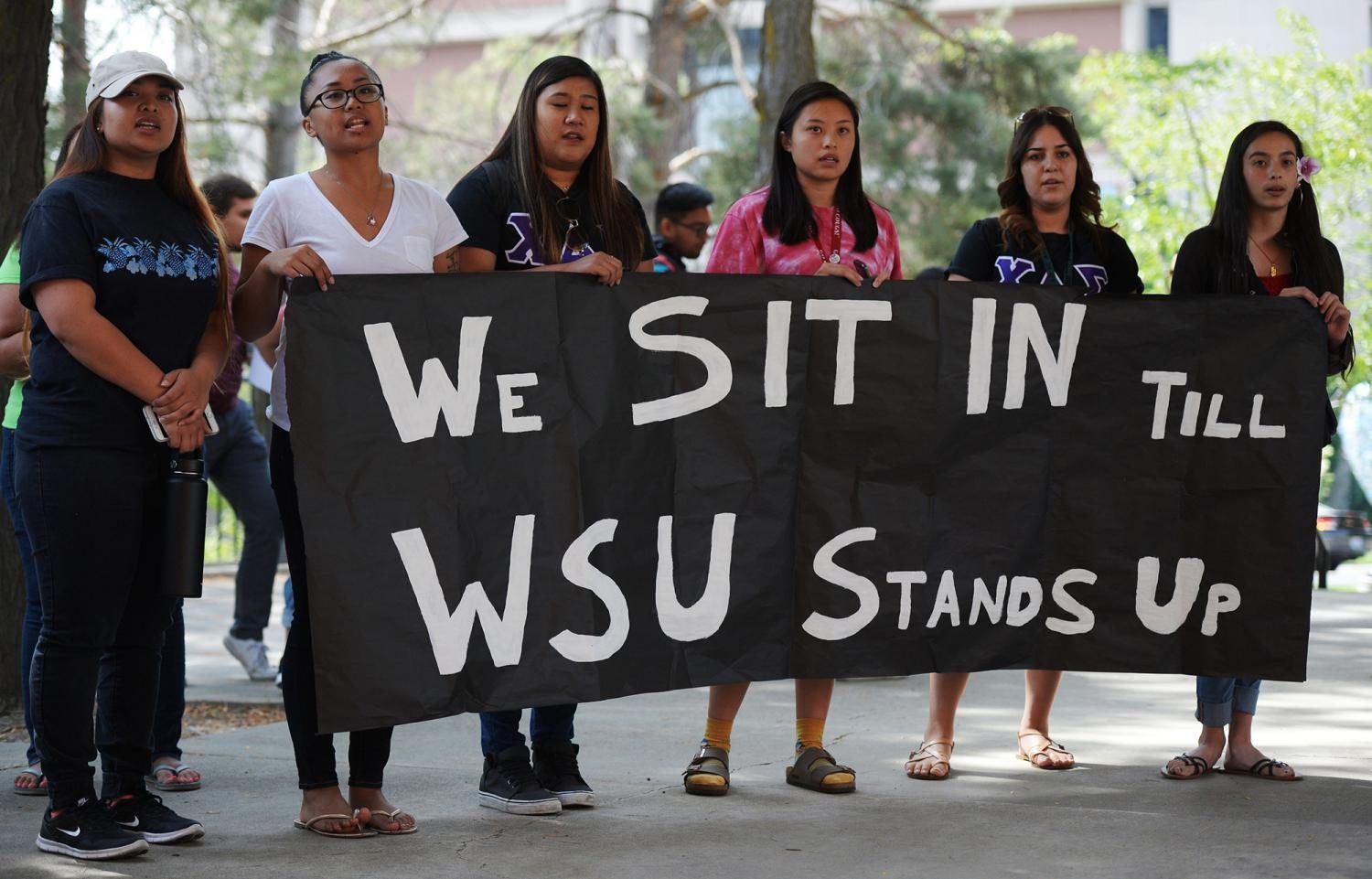WSU students demand cultural representation
Hundreds of WSU students demanded minority representation and services
August 27, 2017
A crowd of more than 200 students, faculty and community members gathered for a sit-in at WSU’s French Administration building Friday morning and demanded WSU leadership take steps to improve WSU’s environment for minority students.
Their five demands included: creating a policy defining free speech versus hate speech; requiring a cultural competency training similar to Green Dot; retaining Critical Culture, Gender and Race Studies, along with resource centers; and hiring more staff and faculty of color. They also demanded more gender-inclusive bathrooms and free menstrual products.
After chanting and marching to the top of the building, they gathered around the stairs near the front of WSU Provost Dan Bernardo’s office in Lighty Student Services and spoke about each of these issues. Bernardo, Executive Director for Compliance Kimberly Anderson and Phil Weiler, vice president of marketing and communication, stood by listening.
Event organizer Chijioke Emeka opened up the floor, calling for immediate action from the administrators.
“Year after year, student leaders are given the same answers and brushed aside….and then begin business as usual,” she said. “Students are demanding action not words.”
The group at Friday’s sit-in was made up of students from the Black Student Union, Gender and Sexuality Alliance, Black Men Making a Difference, Black Women’s Caucus, Asian Pacific American Student Coalition, Unity @ WSU and Movimiento Estudiantil Chicano de Aztlan (MEChA).
Voices of students with testimonials and thoughts on issues echoed around the room. Many expressing their frustration with the lack of diversity training of students and faculty, and a lack of support from others in the community.
“They say, ‘It can’t be done in a day.’ We get that, but it can be done,” one student said after speaking with administrators previously.
One student said a professor had used the racial slur, ‘colored people,’ on a slideshow in one of her previous classes and no one had said anything. A white student responded, saying they needed to support minority groups in order to make a major difference.
“My fellow white allies, we need to show up,” one student said. “This is not about us.”
Many students mentioned the recent bomb threats, swastika drawings, Trump wall and WSU student and former College Republicans President James Allsup’s attendance at the “alt-right” rally as major indicators for needed change in the administration’s policies.
“As students of color, we shouldn’t have to live in fear,” one student said. “We should all have a right to peace on this campus.”
After hearing students’ concerns, Bernardo said the administration was working on making changes.
“We are very interested in action,” he said. “We want the same kind of action you want to see.”
Anderson had similar thoughts after appearing visibly emotional.
“Your voices have been heard,” she said. “I promise we will make a change.”
Many students responded immediately, citing earlier instances where the university had promised change, but the end result was the creation of a committee or a new position.
One student said he was confused because Bernardo had said they were promoting a safe campus for all and yet had not expelled James Allsup, who they felt was a threat toward student safety through hate speech toward other students.
Bernardo and Anderson said both Allsup and the students present had First Amendment protection, and a student could not be expelled for having different views. Anderson encouraged the students to continue with counter-speech.
Emeka said the campus leaders of color would meet with President Schulz and Vice President of Student Affairs Mary Jo Gonzalez, after their return from Samoa on Thursday, to discuss what actions to take with their requested demands.
Emeka concluded the sit-in by addressing the crowd. She said it’s easy to take action when big events occur like the “alt-right” rally in Charlottesville, but encouraged everyone to take action every day in order to make lasting changes.
In previous years, WSU has had similarly politically-charged atmospheres.
In May 1970, The Daily Evergreen reported students affiliated with the Black Student Union, MEChA, Radical Union, Three Forks Peace Coalition, Young Socialist Alliance and the Women’s Liberation Front met in the K-House and drafted 11 policy-changing demands for administration in response to several race-related murders on the east coast around that time.
The group collectively became known as Third World Peoples and their demands were reviewed by former President Glenn Terrell.
During that time, the students boycotted classes, had sit-ins and held multiple marches, including one to Terrell’s house at 2 a.m.
After reviewing their demands, Terrell denied them.









